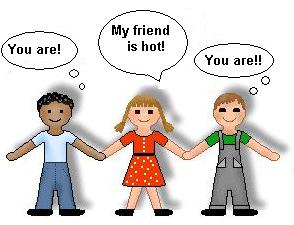If you tend to describe a friend by saying, “she’s nice, but a real gossip,” then people may start to associate “gossip” with you. If you call someone dumb, people may start to associate dumbness with you. If you decribe how beautiful your friend is, then people may think of you as beautiful.

So shows the research by Mae, Carlston, and Skowronski (1998). David Myers summarizes the Mae et. al. research as a particular tendency that people have “when hearing someone say something good or bad about another, to associate the good or bad trait with the speaker.” Furthermore, Myers points out that this could mean that bearers of bad news get disliked, as do strangers that may remind someone of a disliked person.
This is part of a set of research called “spontaneous trait inference,” which includes infering something about a person based on how you may hear that person describe others. (Also within this field, researchers study the effects of describing, for example, a sad event while drinking coffee, and then the trait of sadness being spontaneously from that point on associated unconsciously with coffee).
One study in this field by Mae, Carlston, Skowronski, and Crawford (1999) works like this: participants are asked to memorize some photo and text pairings, such as a photo of a woman and a description about her character, and then later participants are asked to rank the woman on her character. In the same study, another group is asked to memorize pairings of a photo of a woman and a quote that she uses to describe a friend of hers, and then later participants are asked to rank the woman on her character, and the conclusions drawn about the speaker’s character are the same as if she had been describing herself and not her friend.
Even when in a different study, participants are told that pairings of photos and text are random, participants still describe (when asked two days later) the person in the photo as “cruel” or “kind” depending on the random text that had been written next to the photo. Another study in the Mae et. al. (1999) paper is when participants watch a videotape of actors pretending to be college students that describe their friends. Again, people tranfer those descriptions of friends onto the “college students” themselves.
Here is a cute article in Self-Help Magazine about being careful with gosssip. In the Mae et. al. (1999) study, the authors end the paper with their thoughts, “This has significant practical and theoretical implications. It suggests that gossip and other forms of social discourse may have rather surprising, and often unintended, implications for a communicator. Thus, it supports the cliche that if one cannot say something nice about someone, one ought not to say anything at all. It also indicates that self-presenters may achieve desired trait attributions merely by talking about others who have the desired traits.”
Here, here, and here are some additional articles in this field. Could it then be that you are what you say?
